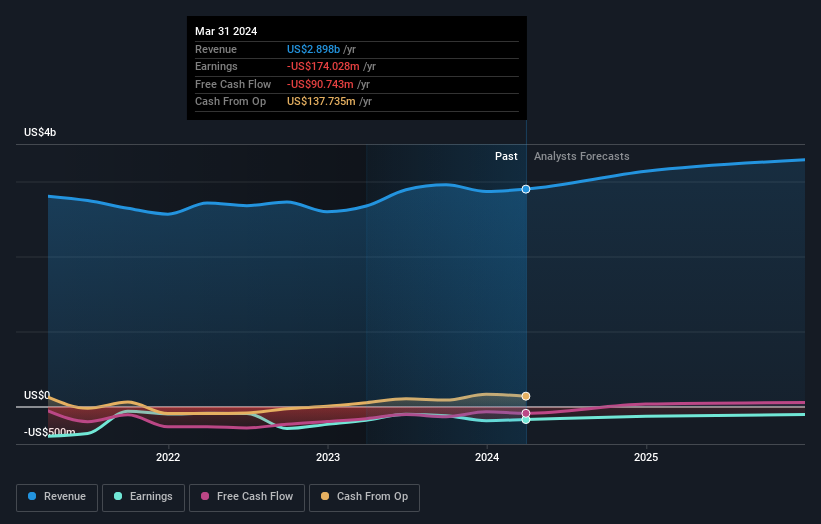- United States
- /
- Healthcare Services
- /
- NYSE:BKD
Despite shrinking by US$52m in the past week, Brookdale Senior Living (NYSE:BKD) shareholders are still up 64% over 1 year

If you want to compound wealth in the stock market, you can do so by buying an index fund. But you can significantly boost your returns by picking above-average stocks. For example, the Brookdale Senior Living Inc. (NYSE:BKD) share price is up 64% in the last 1 year, clearly besting the market return of around 24% (not including dividends). So that should have shareholders smiling. Zooming out, the stock is actually down 23% in the last three years.
Although Brookdale Senior Living has shed US$52m from its market cap this week, let's take a look at its longer term fundamental trends and see if they've driven returns.
See our latest analysis for Brookdale Senior Living
Because Brookdale Senior Living made a loss in the last twelve months, we think the market is probably more focussed on revenue and revenue growth, at least for now. Shareholders of unprofitable companies usually desire strong revenue growth. That's because it's hard to be confident a company will be sustainable if revenue growth is negligible, and it never makes a profit.
Over the last twelve months, Brookdale Senior Living's revenue grew by 8.4%. That's not a very high growth rate considering it doesn't make profits. In keeping with the revenue growth, the share price gained 64% in that time. That's not a standout result, but it is solid - much like the level of revenue growth. Given the market doesn't seem too excited about the stock, a closer look at the financial data could pay off, if you can find indications of a stronger growth trend in the future.
The image below shows how earnings and revenue have tracked over time (if you click on the image you can see greater detail).

If you are thinking of buying or selling Brookdale Senior Living stock, you should check out this FREE detailed report on its balance sheet.
A Different Perspective
We're pleased to report that Brookdale Senior Living shareholders have received a total shareholder return of 64% over one year. That certainly beats the loss of about 2% per year over the last half decade. The long term loss makes us cautious, but the short term TSR gain certainly hints at a brighter future. It's always interesting to track share price performance over the longer term. But to understand Brookdale Senior Living better, we need to consider many other factors. Consider for instance, the ever-present spectre of investment risk. We've identified 2 warning signs with Brookdale Senior Living , and understanding them should be part of your investment process.
If you would prefer to check out another company -- one with potentially superior financials -- then do not miss this free list of companies that have proven they can grow earnings.
Please note, the market returns quoted in this article reflect the market weighted average returns of stocks that currently trade on American exchanges.
Valuation is complex, but we're here to simplify it.
Discover if Brookdale Senior Living might be undervalued or overvalued with our detailed analysis, featuring fair value estimates, potential risks, dividends, insider trades, and its financial condition.
Access Free AnalysisHave feedback on this article? Concerned about the content? Get in touch with us directly. Alternatively, email editorial-team (at) simplywallst.com.
This article by Simply Wall St is general in nature. We provide commentary based on historical data and analyst forecasts only using an unbiased methodology and our articles are not intended to be financial advice. It does not constitute a recommendation to buy or sell any stock, and does not take account of your objectives, or your financial situation. We aim to bring you long-term focused analysis driven by fundamental data. Note that our analysis may not factor in the latest price-sensitive company announcements or qualitative material. Simply Wall St has no position in any stocks mentioned.
Have feedback on this article? Concerned about the content? Get in touch with us directly. Alternatively, email editorial-team@simplywallst.com
About NYSE:BKD
Brookdale Senior Living
Owns, manages, and operates senior living communities in the United States.
Very undervalued very low.


